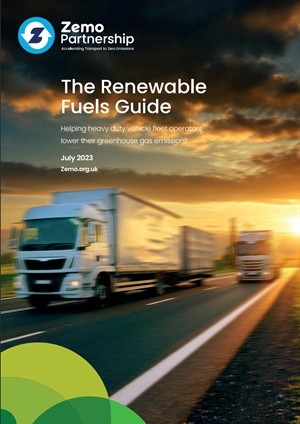Zemo’s new Renewable Fuels Guide shows operators the way to cut carbon emissions from HDVs - today
Wed 19 July 2023
View all news

(Zemo news release:) While the drive to electrify road transport may take most of the headlines, there are other clear options for operators of large, harder (and more expensive)-to-electrify heavy duty vehicles to cut their greenhouse gas (GHG) emissions.
While new, non-zero emission HGVs will be barred from sale from 2040 (and 2035 for sub-26 tonne HGVs), the full market transition of all heavy duty vehicles (HGVs as well as buses & coaches) will take a lot longer than 15 years.
Today, low carbon renewable fuels are contributing a third of all carbon savings from road transport. Over the next, critical decade using lower carbon fuels in the heavy duty vehicle fleet is the biggest opportunity to make a step change reduction in GHG emissions.
Zemo Partnership research shows that GHG emissions from the UK’s HGVs could be cut by an extra 46 million tonnes over the next seven years (2030) – equivalent to 4% of all road transport GHG emissions - if an average of 30% renewable fuel (such as high blend biodiesel, renewable diesel or biomethane) were adopted across the existing HGV fleet. Considerable emissions savings can be achieved up to – and will be needed well beyond - 2040 if the residual diesel HGV fleet were to introduce renewable fuels on a wide scale.
With disclosure of GHG emissions becoming a mandatory requirement for businesses in the UK and internationally – and many organisations incorporating sustainability performance standards into their tendering processes - adopting renewable fuels can provide a highly practical solution, particularly for operators of vehicles with long duty cycles and those with heavy payloads, which are difficult (and, currently, very costly) to electrify.
Report author and Zemo’s fuels lead and Head of Sustainability, Gloria Esposito, said: “We’re delighted to publish this new Guide to help heavy duty vehicle operators who are facing many other challenges, find a way through the maze of guidance and regulations around cutting carbon emissions.
“The Guide has been compiled with the support of Zemo members – manufacturers, fuel suppliers and fleet operators – who have shared their invaluable knowledge and experience.”
Tanya Neech, Head of Sustainability for Scania UK said: “There’s no ‘silver bullet’ solution to reducing the GHG emissions from our sector, which is why we must explore and investigate all technologies.
“Efforts will need focus on three pillars: energy efficiency, renewable fuels and electrification. All three are important, and only by combining them, can we provide sustainable solutions, and be able to reduce GHG emissions on par with the Paris Accord.
“Electrification on its own won’t be enough to reach the GHG reduction targets. To keep the necessary pace of halving the real well-to-wheel carbon footprint from heavy duty transport every decade, sustainable biofuels will be vital.”
Niki Holt, Head of Commercial for Certas Energy said: “There is no well-trodden path on the journey to net zero, nor is there a ‘silver bullet’ solution for decarbonisation.
“As a member of Zemo Partnership, we’re committed to working with partners across the energy industry to support businesses in tackling the energy ‘trilemma’ with practical and effective solutions to accelerate their sustainability efforts.
“Renewable fuels such as HVO have the potential to play a significant role in plugging the gap to net zero and this guide provides businesses with persuasive evidence and practical guidance to take their next step with their energy transition strategy. By switching our own fleet to HVO, we’ve successfully exceeded our own 2025 carbon reduction target three years ahead of schedule and we look forward to supporting more HGV operators in doing the same.”
James Westcott, Chief Commercial Officer, Gasrec said: "Decarbonisation is the biggest challenge fleet operators will be facing over the next decade. Having information like this will help the industry make the right decisions and accelerate the transition to low emission fuels."
Claire Bishop, Vice President, UK Land, Watson Fuels said: “As proud members of Zemo Partnership, we fully support the goal of helping HGV operators better understand ways to reduce carbon emissions. We’re committed to supporting our customers in planning their respective energy transitions, and the Renewable Fuels Guide is an important resource to aid this mission.”
Daniel Mitchell, Chief Executive Officer, addvantage Global said: ”We’re proud to sponsor this guide and help highlight how heavy duty truck fleets can reduce their carbon footprint – including retrofitting addvantage which delivers an instant 23% reduction”
Zemo’s new Renewable Fuels Guide is intended to help HGV operators on their journey to net zero and to explain the low carbon fuel options available today. Fuels covered include biodiesel, renewable diesel, biomethane and bio-propane. Each section provides an overview of the UK’s renewable fuels market, the current deployment of renewable fuels in the HGV fleet (with case studies), plus the fuels’ GHG emission performance and primary sustainable feedstocks. It also includes operational information including public and depot-based refuelling infrastructure, as well as financial information.
The Guide also lists heavy duty manufacturers engine models that are approved to run on high blend biodiesel (e.g. B20, B30) and renewable diesel (e.g. HVO).
Download the Renewable Fuels Guide here (link) and appendix (link).
For the full media release click this link.
Related Links
< Back to news list